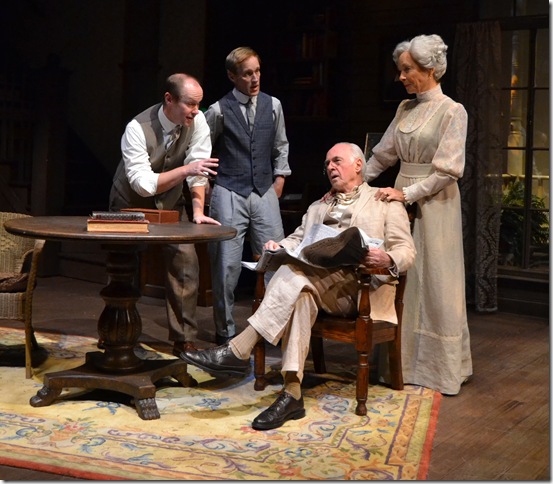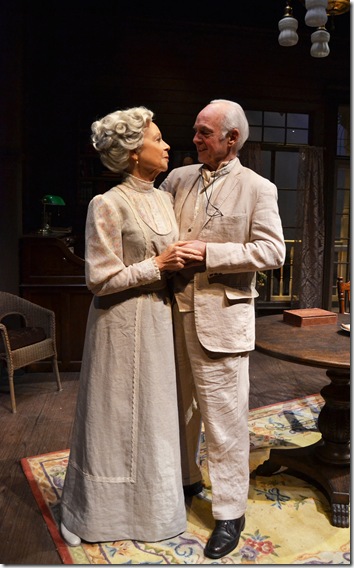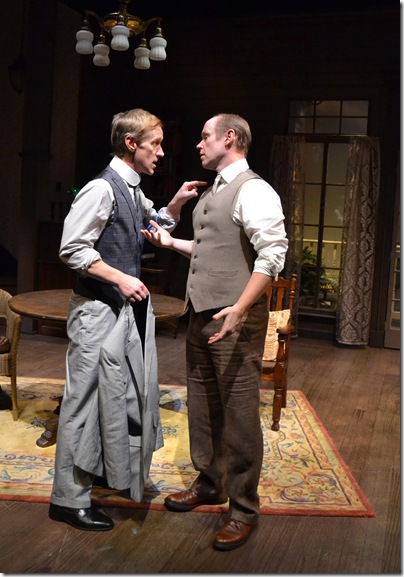Even for a theater company like Palm Beach Dramaworks whose mission is exploring the major plays of the American stage, it took them a decade and a half to approach Eugene O’Neill’s Long Day’s Journey into Night, one of the great works of the 20th century.
“The organization had to be ready, I had to know for the most part who my cast was going to be,” says producing artistic director William Hayes, who stages the Pulitzer Prize winner opening tonight. “It’s a mountain, and it asks you to do a lot of dangerous things, because you have to dredge up a lot of emotions. It stirs things up in yourself and you have to feel strong and ready to go there.”
Long Day’s Journey is O’Neill’s most autobiographical play, performed only after his death, as the dramatist had specified. It concerns the Tyrone family — fictional versions of the O’Neills — patriarch and stage actor in melodramas James, his wife and morphine addict Mary, and their two sons, Jamie and Edmund.
These are towering roles, which the cast members approached with reverence. “I think any actress looks at it and dreams about it,” says Tony Award nominee Maureen Anderman, who plays Mary Tyrone, joining the cast in mid-rehearsals when Joy Franz withdrew for “personal reasons.” “The words are incredible, as are the emotions that come out. It’s magnificent. It really is.”
Recalling her reaction when the phone call came, asking her to join the cast just two weeks before the production was scheduled to open, Anderman says, “I was shaking. I was just shaking, but I thought, ‘This doesn’t come around often. Here I am, my brain still works, I can still act and this isn’t going to come again.’ I just thought I would plunge in and not look back. I didn’t have time to think about it, fortunately.”
Frequent Dramaworks veteran Dennis Creaghan (A Delicate Balance, Freud’s Last Session), now playing James Tyrone, agrees about the dramatic power of O’Neill. “The people who write these things are poets. He’s in the same league with Shakespeare and (Arthur) Miller. These are the greats. They write the great words, words you want to say.”
Like most major roles that actors are drawn to, they can see a bit of themselves in the characters. “There’s her Catholicism, which I can totally relate to,” notes Anderman. “Her drug addiction which, blessedly, I don’t have that issue. And her relationship with her husband, being married to an actor.” Anderman is married to stage and screen performer Frank Converse.
Creaghan feels that everyone should be able to relate to the play. “It’s the great theme, ‘Why are we here?’ With this little three score and ten that we’re allowed, what do we do with it? Do we use it well? Do we not use it well? The great writers write about this.
“And it’s the primal group, it’s your family. The parents and their offspring. You’re never closer to anybody than you are to those people.”
As director Hayes puts it, “Just as the playwright is exorcising his demons — he says he wrote the play to forgive the four haunted Tyrones — somehow it helps us deal with our own situations, because we’re relating to what’s going on within their family dynamic.
“There is love in this home, but little understanding, or helping or connecting,” says Hayes. “It’s a dysfunctional love, but there is love there.”
“The play is relentless. It’s O’Neill and once you step into that world …,” Anderman says, her thought trailing away. “They keep talking about the fog surrounding you in the play. Well, O’Neill surrounds you and you step into his world and you’re in a different environment.”
Rather than do a lot of research on the O’Neill family, which she really has no time for, Anderman is drawing almost exclusively from the script of Long Day’s Journey. “I think it’s more helpful and clearer just to concentrate on the play. You really don’t need any more than what’s on the page,” she says “And every time I go over it, I find new things. And I’ll continue to, until the end of the run.”
For his part, Creaghan finds James Tyrone “not a terribly complicated man.”
“He’s the result of his upbringing, which was just awful poverty. And he grows up and finds a way to make an awful lot of money,” referring to the character’s repeated performances in the melodrama, The Count of Monte Cristo. “It seems to answer his need, but he also has this very artistic side that he has to give up. It’s a Mephistophelian bargain and he sells his soul and regrets it for the rest of his life.”
Advising potential audience members who may feel intimidated by O’Neill and his reputation as a master tragedian, Anderman says, “If they want an extraordinary theatrical experience — which you don’t get often — I think this will really touch people, in their hearts. They’ll look at themselves differently. This is a family and these people say things that most people in families these days won’t say, even if they’re feeling it.”
The operative word in the play’s title is “long.” Hayes selected a text used by the Oregon Shakespeare Festival, which has some cuts approved by the O’Neill estate. Even so, he says, “I think with one intermission, I think it will be under three and a half hours.”
When asked if that will be exhausting for his audience, he responds, “It should be. Exhausting, exhilarating, disturbing, unsettling and moving.”
Long Day’s Journey into Night opens tonight and runs through March 6 at Beach Dramaworks, 201 Clematis St., West Palm Beach. Tickets: $64. Call: 561-514-4042.


